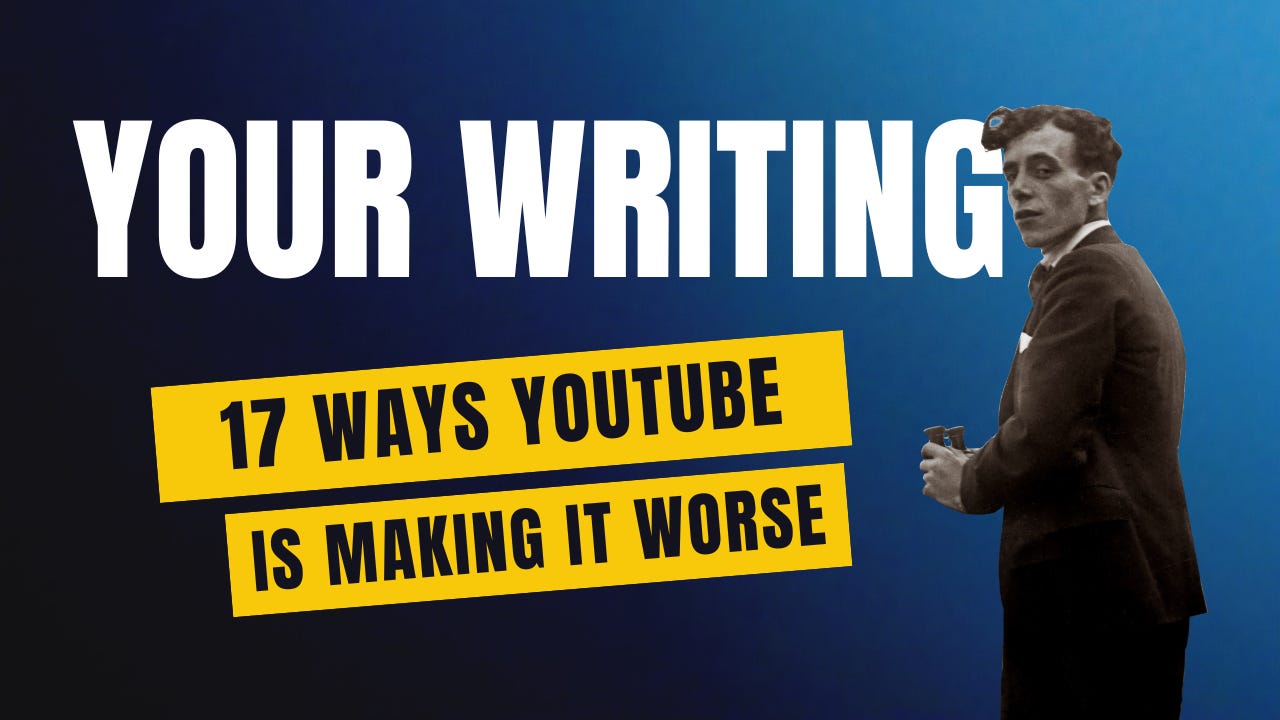17 examples of why YouTube writing advice videos are hurting you
That title is clickbait. And this is a self-aware post.
There are entire YouTube channels dedicated to helping authors learn how to write better fiction, better prose, better characters, and better worlds.
Great, right?
So you’re scrolling on YouTube, perhaps looking for a little inspiration before you settle down in front of your laptop and try to solve that pesky scene where it just feels like something is wrong, even though you can’t quite put your finger on it.
Then you see this:
Nine Reasons Readers Ditch Your Book on the First Page
Oh, no. You don’t want readers ditching your book on the first page. So you click.
The first reason is:
You have typos.
Okay, well, that’s pretty obvious, but any one of the other eight could be destroying your writing. The YouTuber also said the last one is the most important, so you keep watching.
Your details aren’t consistent.
You’re overexplaining the lore too soon.
You aren’t giving the reader a reason to keep reading.
It all seems fairly obvious at this point, and you already know to avoid all that, but surely the next one will be…
You aren’t starting off with action.
Now wait a second, you think. Some of the best books out there start out with a strong narrator voice and an interesting premise, not action. Didn’t Tolkien do that in The Hobbit? Rowling did the same in the first Harry Potter book too…
Still, you keep watching. And by the end, you’ve also learned you should:
Not be confusing.
Have likeable characters.
Make it clear what the story is about.
Not use cliches.
All of this is fine—though you can think of great books that broke each one of those last four rules—but at least now you know you are aware of all nine mistakes.
And YouTube keeps showing you more related videos to watch:
7 Ways Your Plot Is Failing
The One Mistake Great Authors Don’t Make (But You Might)
8 Reasons Your Worldbuilding Doesn’t Work
6 Ways Not to Write Female Characters
DON’T Write Scenes until You Know THIS Method
10 Reasons Publishers Are Rejecting Your Book
5 Ways to Fail at Worldbuilding (and 5 Ways to Succeed)
How to Make Your Dialogue Actually Good
This Foolproof Trick Ensures Readers Never Put Down Your Novel
Don’t Be Boring: How to Keep Readers Engaged to the Last Page
13 Plot Structures Ranked from Best to Worst
Are You Writing Cliche Characters?
6 Hard Truths Writers Ignore until It’s Too Late
7 Endings that Will Make Readers Hate Your Novel
This Trick Solves Your “Middle” Problem Every Time
6 Ways Your Opening Lines Fail
That might have hurt to read. If you just scanned them, I recommend re-reading them without scanning. Think about what they are doing.
Those titles are all based on real YouTube videos from channels that consistently get tens of thousands of views. They’re fake but not exaggerated.
Notice the two key categories these fall into:
Fear. YOU might be doing something wrong and THIS video can solve that.
Promise. THIS video can give you the ONE THING you need to get good.
Even the promises have implied fear; you are missing something big. Something you need. Something others know but you don’t.
And they work. They’re compelling. Those aren’t even real titles, but if they were linked to actual videos… you might click. Just to be sure. I know I’ve done similar.1
But suppose you don’t click. And eventually you have to not click since YouTube will feed you such advice until the Third Age ends.
Then you sit down and try to write.
You try to write after more video titles than you can watch have told you, one way or another, that you’re not doing it right. That you don’t know the best trick. That you are failing. That there are dozens and dozens of failure states for your novel, and negotiating them is a like a minefield, and readers will give into their hate and…
That’s not good for our minds, even if they’re not wrong and even if they note their advice isn’t universally true.
It’s too easy to get psyched out as a writer—especially when writing fiction. And there are better, more life-giving ways of gaining the same knowledge about writing dialogue, characters, plot, and theme.
If your subscriptions and feed are full of writing advice videos, I recommend looking at the titles carefully. How many of those titles are designed to spark doubt and fear—including a fear of missing out?
Consider for yourself whether the cost is worth it—or whether resisting and retraining the algorithm could help you more. Is what you are consuming truly feeding your mind and soul in its effect? Or is it feeding on your fears and insecurities?
For myself, I want to be fed, not fed upon. There is great writing content on YouTube. I recently watched this fantastic interview with Dean Koontz. The title is catchy but not rooted in fear or an unrealistic promise. The content is stellar—thought-provoking for me not only as a writer but as a human being.
You should consider watching it. You won’t know what you’re missing if you don’t.2
What if a subscription service could make all the decisions you don’t want to make?
I explore that concept in my short story The Deciding Service. Decide to check it out below at any one of a variety of booksellers. It’s even free at most of them.
Just kidding. I’ve definitely never been sucked into such videos against my better judgment. Really. This is all hypothetical speculation. I promise. *sigh*
Yes, this is a joke. Mostly. It really is a fascinating interview. He casually talks about witnessing a murder and having a gun put to his head.



